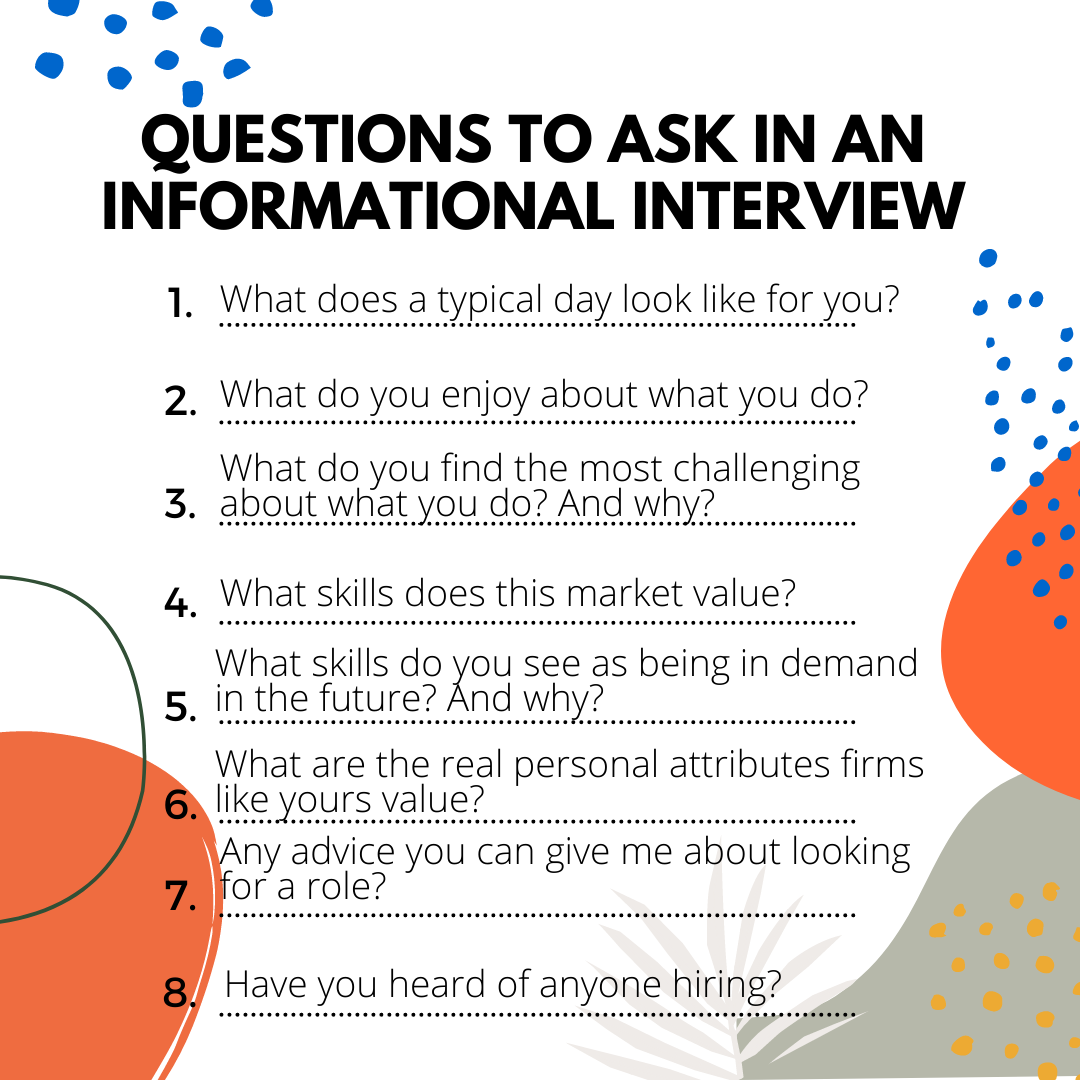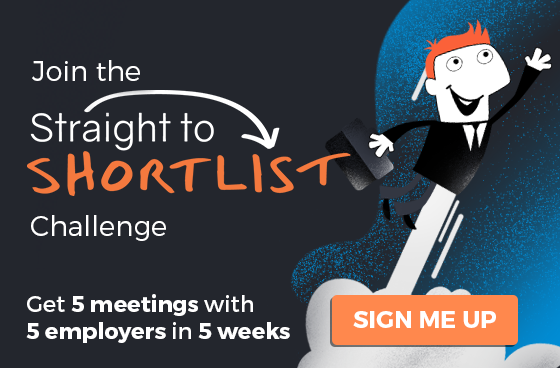So you’ve been searching for the right questions to ask in an informational interview.
But my educated guess is that’s not what you really want to know.
I think what you are asking (or should be asking is…).
“How do I turn this informational interview into something more?”
“How do I get this person who’s sitting in front of me to give me a lead to offer to pass my resume along?”
“How do I get this person to think about me when they hear about a job?”
Have I hit the nail on the head?
I mean imagine that you could achieve all that in one simple meeting!
The good news is there a way to turn your informational interview into job leads and job offers.
There’s a particular way to set up and manage this informational interview, and a particular order to ask questions, s0 the meeting and conversation flow naturally.
And then, it becomes natural for that person to make an offer to help you!
So that’s what we’re going to cover in this blog.
Before You Start Asking the Informational Interview Questions
Firstly, the elevator going into the meeting or any place where you’re walking to that meeting is not the place for your elevator pitch.
This is because you’re already selling yourself before you know what’s relevant to sell!
Why most people do this is because they’re nervous, so, I want to talk to you about how to break the ice – how to get over that awkwardness when you meet somebody for the very first time.
Instead of launching into a spiel about yourself, I recommend you say:
“Thank you very much for meeting me. I really appreciate your time.”
And say that sincerely.
A couple of questions you could ask are:
“What’s keeping you most occupied right now?”
Or “What are you enjoying about what you’re working on?”
These are called icebreaker questions because they break the ice by being really easy questions for the other person to answer.
They warm the other person up.
So let’s now move on to when you’re sitting down in front of someone.
When you sit down in this meeting, this is what the other person that you’re sitting in front of is going to be thinking:

So, it’s going to be your job to facilitate the informational interview.
And I’m going to give you the exact way to do that.
How to Start the Informational Interview
You should make it comfortable for the other person when you’re sitting down in front of them.
You want to thank them for the meeting, explain simply who you are, and explain why their experience interests you.
And you want to state that you’d appreciate the opportunity to ask them questions.
Let’s use the example of me being a Change Manager, new to the Australian market. I’ve arranged to meet another Change Manager who’s experienced in Australia and can give me some great information about the local market.
Here’s how I would open the informational interview:
“Thank you very much for meeting with me.
I’m a Change Manager and I’m new to the Australian market.
I’m looking for my first career opportunity here.
I saw from your LinkedIn profile that you’ve worked as a Change Manager across different sectors in financial and consulting, so I thought you’d be really well-positioned to give me some great advice.
I want to find out more about what you do and what change management skills that this market values.
Would you mind if I ask you a few questions?
I’ve got a few questions prepared.”
This structure opens up the meeting. It also puts the other person at ease.
It also sets up the framework for the questions you’re about to ask to get information about the market in your informational interview.
Once you do your introduction, the person you’re meeting will think something along these lines:

So now, the person you are meeting feels really comfortable and then you can go into the questions you want to ask.
Here they are.
Questions to Ask in the Informational Interview
The questions are all about what you specifically want to know from this person.
The information that you could get from them that might help you:
- change your career
- enter a new market
- change sectors
- step-up into a new role or achieve a promotion
- return to a previous role that you’ve done
So, going back to our example of the Change Manager, these are the questions she might ask.
These are designed to get the other person talking.
They should be easy for that person to answer because they’re coming directly from her experience.
So here are the questions!
- What does a typical day look like for you?
- What do you enjoy about what you do?
- What do you find the most challenging about what you do? And why?
- What skills does this market value?
- What skills do you see as being in demand in the future? And why?
- What are the real personal attributes firms like yours value?
- Any advice you can give me about looking for a role?
- Have you heard of anyone hiring?

Asking these will get you some fantastic information that you’ll be able to use in a future applications and in your cover letter, your resume, or your LinkedIn profile.
But one of the main reasons you’re asking these questions is to start to build a connection to start a relationship.
Because what’s most likely to happen once you’ve asked these questions about them, is they will actually ask this question of you –
“What are you looking to do?”
And then, you want to tell them only the bits of your background that are relevant for them to understand you.
So, it will be easy for them to help you.
This is how the Change Manager might answer that question:
“It sounds like we enjoy the same things about change management.
I’ve had 10 years of experience in consulting and large enterprises working on a range of projects from cultural change to IT-related projects.
So, I’m looking to find a similar role.”
So now, the person that you’ve met has some information about you.
They now know how to help you.
It’s most likely that they’ll start to ask more questions about you and your experience.
And then, they may offer to help you.
They might offer to pass your CV along, recommend you for a job, or suggest that you contact somebody else.
They might also keep their eye out for you for jobs within their firm!
I hope you found these tips and questions very useful for your next informational interview.
These came from my Straight to Shortlist Challenge where my clients have used informational interviews to tap into the hidden job market, and find jobs before they get advertised!
If you also want these results, then join the challenge!
Watch my YouTube video where I also discussed these questions:

 Follow
Follow

{ 0 comments… add one now }